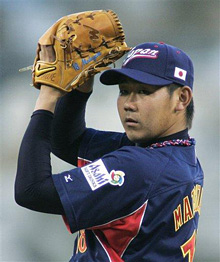|
|
| DAISUKE MATSUZAKA / BANDERASNEWS.COM |
Theo Epstein, Tom Werner and Larry Lucchino have appropriately absorbed most of the blame for a season straight from hell. They sacrificed a franchise shortstop and a prized prospect for Josh Beckett and Mike Lowell. They traded a catcher incapable of handling the knuckleball and a gem hidden in the farm system for Doug Mirabelli. The best prospect in the last five years was dealt for Coco Crisp. While it may be too early to judge on some of those decisions, most can agree they have turned out, well, not so great. Add a few other trades to the mix that have been less than opportune, throw in a huge spoonful of injuries and underachieving, and folks, you have a third place team. The 2006 Boston Red Sox.
Theo needed to act. The Red Sox spend somewhere in the range of 125 million dollars to field a team competitive enough to match both New York and now Toronto, and to give the Sox the best chance to win the World Series. That??s the ultimate goal. The glaring needs were evident- an ace at the front of the rotation, two strong bullpen arms with one being a legitimate closer, a backup catcher and addressing the middle infield. With all of the faults of the front office over the last two years, most teams like the Pirates or Brewers would have to turn into full rebuilding mode. They simply can??t recover that easily. Due to the Red Sox financial situation, they can afford to turn the ship around quickly and continue fielding a competitive team every day. It??s not at the level of the Yankees being able to shrug off Jaret Wright, Carl Pavano and Kevin Brown, but we??re approaching that plateau.
The Matsuzaka situation exemplifies the front office??s train of thought heading into the winter. They could afford to go after Matsuzaka for a large sum of money for many reasons. One, the Red Sox collect a stream of money from TV contracts, merchandise and ticket sales that most other teams cannot match. Two, John Henry is a rich, rich man and is not afraid to reach into his pockets for the good of the ball club. And third, decisions like not overpaying for Johnny Damon, Pedro Martinez and dealing Edgar Renteria have given the Sox the monetary option of signing a frontline starter this off-season. The Red Sox, believe it or not, do have a budget. A big one, but it??s still a budget. This Matsuzaka signing fits right into that budget.
Just last September, we found ourselves in the final stretch of a lost season. Following the Yankees sweep, a flooding of injuries and other serious concerns like a prized prospect finding out he had cancer, the Sox felt (I hate to use this word) cursed. Everything that could go wrong did. The rotation looked something like this: Josh Beckett, Kason Gabbard, Kyle Snyder, Kevin Jarvis. We also had to feel the wrath of one Jason Johnson and David Pauley. These are times I wish to forget. The front office knew they had to strengthen the pitching depth and acquire a frontline pitcher to go along with the declining Schilling, the average Wakefield, the underachieving Beckett and the big question mark, Jon Papelbon.
When Matsuzaka went on the market, the clear favorites were the Yankees and Mariners. When Seattle dropped out to pursue Jason Schmidt, the Yanks looked like the clear winner. They needed a starting pitcher almost as badly as the Sox. They had the capabilities to bid an enormous number and blow away the competition, we all knew this. Whether or not they felt their bid of 32 million was enough is not known, but the Red Sox bid roughly 19 million more. It??s obvious we needed a potential ace, but why invest so much money in one Japanese pitcher that has never thrown a strike in the majors?
First off, the Red Sox, Theo Epstein and their scouts and consultants must have all felt he was the best ?

